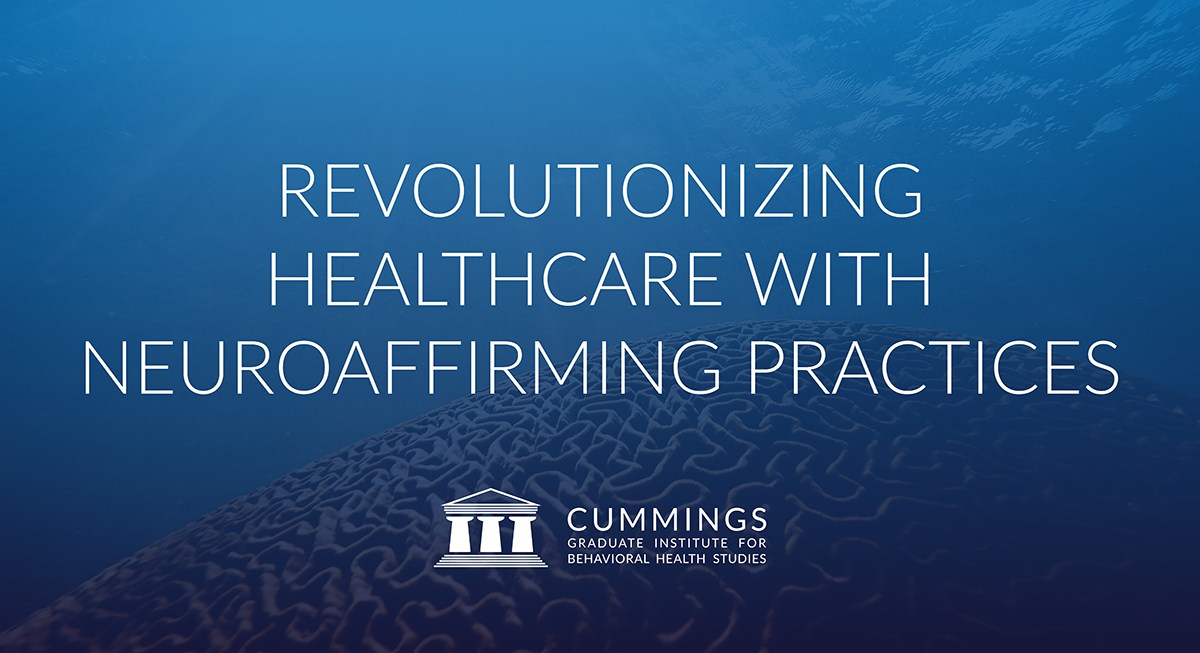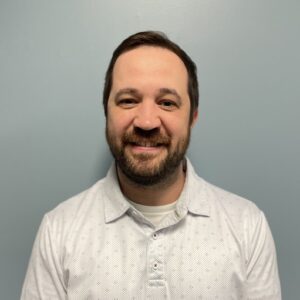 New Podcast Episode Explores the Future of Neurodivergent Care
New Podcast Episode Explores the Future of Neurodivergent Care
January 6, 2025
 In the latest episode of Disruptors at Work: an Integrated Care Podcast, guest host Dr. Pauline T. Pablo, Doctor of Behavioral Health (DBH) program alumna at Cummings Graduate Institute for Behavioral Health Studies (CGI), explores the definitions of neurodiversity, neurodivergence, and neuroaffirming care, and take a deep look into the state of neurodiversity within today’s behavioral health system with 3 subject matter experts, Dr. Patricia Motylewicz, Dr. Cory Cannady, and Dr. Valeria Parejo. They discuss the challenges neurodivergent individuals face in traditional healthcare settings, the role of integrated care in addressing these gaps, and the transformative impact of neuroaffirming practices on patient outcomes. From practical strategies for healthcare professionals to future innovations in neurodivergent care, this episode provides a comprehensive look at creating a more inclusive healthcare system.
In the latest episode of Disruptors at Work: an Integrated Care Podcast, guest host Dr. Pauline T. Pablo, Doctor of Behavioral Health (DBH) program alumna at Cummings Graduate Institute for Behavioral Health Studies (CGI), explores the definitions of neurodiversity, neurodivergence, and neuroaffirming care, and take a deep look into the state of neurodiversity within today’s behavioral health system with 3 subject matter experts, Dr. Patricia Motylewicz, Dr. Cory Cannady, and Dr. Valeria Parejo. They discuss the challenges neurodivergent individuals face in traditional healthcare settings, the role of integrated care in addressing these gaps, and the transformative impact of neuroaffirming practices on patient outcomes. From practical strategies for healthcare professionals to future innovations in neurodivergent care, this episode provides a comprehensive look at creating a more inclusive healthcare system.
Thank you to our host and subject matter experts:
- Dr. Pauline T. Pablo, DBH, BCBA, IBA
- Dr. Cory Cannady, DBH, BCBA, LBA
- Dr. Patricia Motylewicz, MBA, MS.SpecEd, MS.ABA, DBH, BCBA, QBA, LBA
- Dr. Valeria Parejo, DBH, BCBA, QBA
About the Episode Host

Dr. Pauline T. Pablo, DBH, BCBA, IBA
Dr. Pauline Tolentino Pablo, CGI DBH program alumna, is a trauma-aware Board Certified Behavior Analyst, mother, wife, and healthcare advocate. She holds a Bachelor of Arts degree in Psychology and a Master of Arts degree in Teaching with a specialization in Applied Behavior Analysis. She earned her Doctor of Behavioral Health (DBH) degree from Cummings Graduate Institute for Behavioral Health Studies in 2023, a degree that has equipped her with the knowledge to serve her clients with a human-centered, trauma-informed, and integrated healthcare approach. Her work as a behavior analyst focuses on providing behavioral support services to neurodiverse individuals diagnosed with various developmental disabilities. Dr. Pablo co-owns and operates Symphony Behavioral Health Inc., a neurodiversity affirming ABA company serving the southern California region. She is also the co-founder of Asian and Pacific Islander Association for Behavior Analysis (APIABA), a non-profit organization that aims to disseminate the science of ABA within the Asian and Pacific Islander population, as well as promote diversity within the field to better serve diverse populations.
Connect with Dr. Pablo
Instagram: @integratedbx
Instagram: @symphonybehavior
About the Special Guests
Dr. Cory Cannady, DBH, BCBA, LBA
Dr. Cory Cannady, CGI DBH program alumnus, is a Board Certified Behavior Analyst and the Assistant Clinical Director at Elevate. He is from a small town in west Tennessee and moved to Chattanooga in 2009 to attend UTC. After earning his Bachelor’s in Secondary English Education, he taught for the Hamilton County Department of Education for 5 years. While teaching, he obtained his Master’s Degree in Applied Behavioral Analysis from the University of Cincinnati in 2017. He obtained his Board Certification and licensure in 2019. Cory has recently completed his Doctor of Behavioral Health degree from Cummings Graduate Institute for Behavioral Health Studies.
Dr. Patricia Motylewicz, MBA, MS.SpecEd, MS.ABA, DBH, BCBA, QBA, LBA
Dr. Patrycja (Patricia) Motylewicz, CGI DBH program alumna, is a Board-Certified Behavior Analyst, and a Qualified Behavior Analyst licensed in several states nationwide. She holds three master’s degrees: an MBA, an MS in Education and Special Education, and an MS in Applied Behavior Analysis with a specialization in Autism. She is the clinical director at The Perfect Child, which provides Applied Behavior Analysis services for children and young adults with developmental disabilities. In her free time, she focuses on strength training and is a former competitive martial artist.
 Dr. Valeria Parejo, DBH, BCBA, QBA
Dr. Valeria Parejo, DBH, BCBA, QBA
Dr. Valeria Parejo received her Doctor of Behavioral Health degree from the Cummings Graduate Institute for Behavioral Health Studies, and has a Master’s in Applied Behavior Analysis from the Florida Institute of Technology. She is a behavior analyst with BCBA and QBA certifications and has over 20 years of experience, working in various areas such as: Intensive behavior group homes with adults diagnosed intellectual or developmental disabilities, psychiatric disorders, and severe behaviors, Consulting in schools and clinics, Supervising and mentoring professionals in ABA and behavioral health, Teaching at the graduate and undergraduate levels, students seeking international ABA certification – in English and Portuguese, Staff training and management, Clinical evaluator for accreditation of clinics in ABA focusing in best practices, OBM consultation to ABA clinics, Integrated Care, Sexual health and sexual behavior. Nowadays she teaches at Florida Institute of Technology in the approved coursework for BACB certifications, and at The Behavior Web, in the preparatory course for QABA certifications, the first course to be available in Portuguese for behavior analysts seeking international certification. She offers mentoring and supervision for professional development, and clinical and OBM consulting for clinics.
Connect with Dr. Parejo
Instagram: @dr.valeria_s_parejo
LinkedIn: Dr. Valeria Parejo, DBH, BCBA, QBA
































